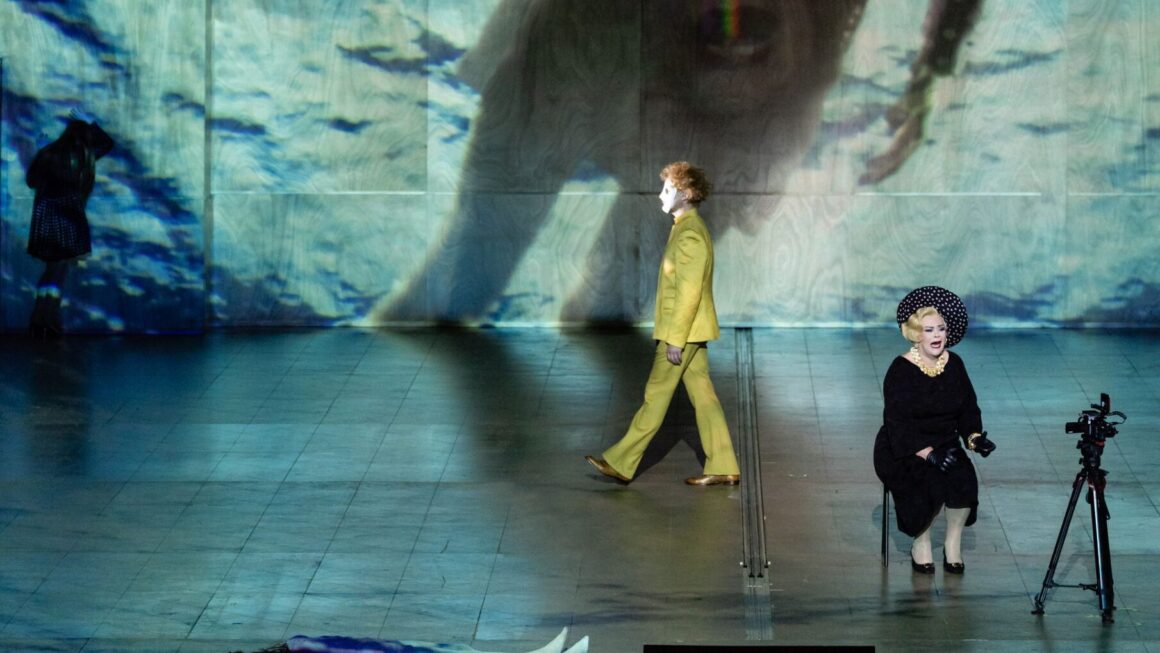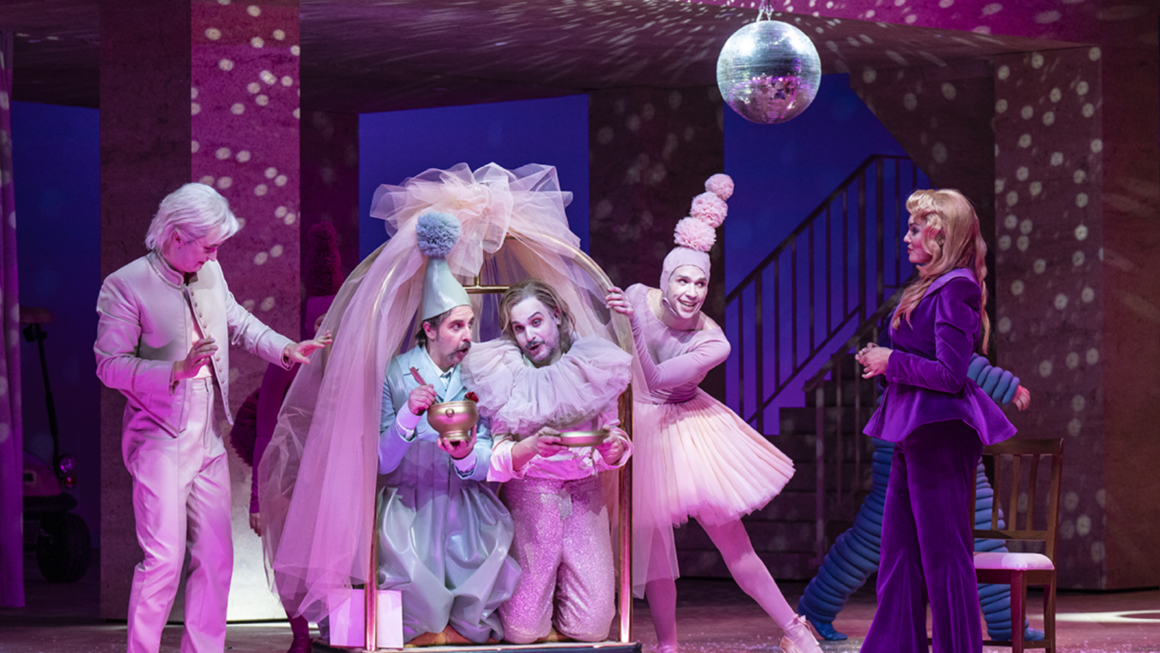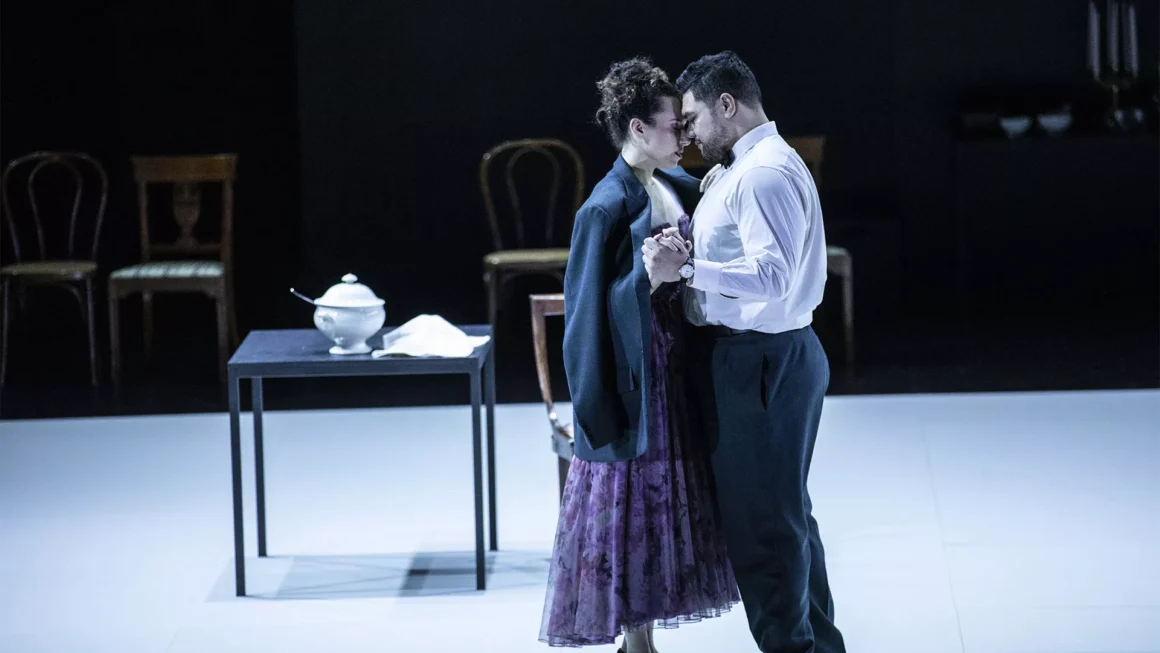Zázrak! Vskutku třeba říci, že zázrak! (Wonderful! You’ve got to admit, it’s wonderful!) That’s how Kudrjáš (James Ley) begins Leoš Janáček’s 6th (of 9) opera, thrilled by the majesty of the Volga (the longest river on the European continent, whose spellbinding beauty has been the subject of arias of infinite finesse, such as the Glyanut s Nizhnego aria in the 1st act Tchaikovsky’s The Enchantress, which we saw this year at Oper Frankfurt). There is the better formula to start this production: it is a pure delight. This is one of his performances where the best has been given and the result is worthy of the investment. And yet it is one of the most difficult works (vocally at least) in Janáček’s repertoire. From a rough, sometimes arid vocal material, bordering on abrasion at times, all those involved succeeded in bringing out a work of great sensitivity, a reflection, in the contemporary social context, of traditions that can lead to the crushing of individuals.

It may seem like there are many possible readings – thanks to the intelligent, subtle and refined direction and materialisation of the dramatic space by Krzysztof Warlikowski and Małgorzata Szczęśniak – but they all tend towards the central artery of the work: Káťa (Corinne Winters), bewitchingly beautiful, happy and free-spirited before her marriage with Tichon (John Daszak) – Jaká jsem bývala rozpustilá! – finds herself torn between her desire to live (and it’s not just her love for Boris (Pavel Černoch)) and the constraints of an overly oppressive environment, sacralised in the terrible Kabanicha (Violeta Urmana); in such an anxious and implacable atmosphere, where all is sin and condemnation, only the power of the Volga is capable of welcoming and fulfilling such a desperate wish for freedom.

This freedom quest, at the cost of her own life, is initiated by Káťa as early as Act 1, in the sublime first monologue Ach, byla jsem zcela jinší! followed by Potom jsem šla do kostela. We are astonished to feel such nostalgia and to see the clarity of Corinne Winters’ singing, capable of so fully restoring memories of unequalled sweetness and crystallinity. She is the one who best embodies this character who evolves from extreme purity to the most exacerbated sensuality, all the while dosing with milimetre accuracy the aromas that make these transformations, these comings and goings, a source of the most intense emotion. And what authority she brings to the Czech language, so arduous to render intelligibly in song! The background movements performed by the orchestra (under the direction of Marc Albrecht) are capable of embroidering the pictorial tableaux described by the characters with an infinite number of elements that recreate, in an almost tangible way, the dome of the church, the smoke coming from the candles, the cloud forming above the character. And we truly believe that, with such beauty, the angels she speaks of are indeed present, through this voice of the most limpid delicacy.

It is a pleasure to follow Káťa’s evolution under the compassionate gaze and impulse of Ena Pongrac’s sparkling and luminous Varvara. Much more than a soubrette soprano – her singing is assertive, imposing and cheeky, as befits her character – she is the only glimmer of joyful lyricism in this piece – along with the warm voice of James Ley’s Kudrjaš. Between these two female beings under the yoke of a society ready to annihilate any form of individual attitude that strays from its shackles, the almost fraternal togetherness essential to Káťa’s confession goes back long before the story begins on stage. Pavel Černoch’s well-projected voice, with its ample resources, allows the sometimes difficult-to-silhouette contours of this character to be well traced. The vision of Boris is unflattering – both according to the libretto and the staging, an elusive man, as if afflicted by blindness making him almost indifferent to Káťa’s drama – but the beauty of the singing, particularly during their meeting in Acts 2 (Ta noc! Písně! Dostaveníčko!) and 3 (Vždyť je to její hlas!), makes him, for a few moments, more sympathetic.

Over and above the set and the supporting cast – all well distributed, contributing to an increased sensation of anoxemia and oppressiveness -, which evoke the moral/social tyranny of a place – that could be Russia or anywhere else, in any era -, it is above all the frightening Kabanicha who condenses all the weight and darkness of a suffocating tradition capable of incriminating and, consequently, pushing Káťa to put an end to her misfortune. Violeta Urmana is in charge of portraying this character who, for all her apparent elegance, fine manners and haughty bearing, is nonetheless hysterical, frigid, incapable of the slightest tenderness towards anyone, scathing at every intervention and whose singing is nothing more than a raucous outburst of ranting, particularly towards her daughter-in-law. Fortunately, this formidable interpreter is able to make Marfa Ignatievna’s expression a little more digestible thanks to a timbre warm enough to slightly attenuate the stridency that can easily be reached at various points in the opera, while remaining sharp and resolutely hateful. Her hypocrisy and sadism are palpable in this richly coloured performance, less Machiavellian than usual (her bursting into tears during the opera’s gripping final scene demonstrates this quite well), without any excess – the character already offers quite enough for us to add to it – and delivered by one of the greatest singers of her time. Her son is John Daszak, whose voice is powerful – sometimes croaky – but sour enough that, with his interpretation of a simpleton and inept Tichon, muzzled because he has been under the wing of a despotic mother for too long, we wonder how the beautiful Kat’a could have fallen in love with this character! Last but not least, Milan Siljanov’s Dikój, all (mafia) elegance, is the perfect companion for the Kabanicha’s wickedness, delivering a performance in which his beautiful and noble bass-baritone voice is put to the test: no unction, rough, growling, dark in every line, a scoundrel from head to toe, as insidious as the Kabanov matriarch. These two singers will be recognised for their immense talent in interpreting such boring roles.
A triumphant production on every level of one of the masterpieces of Janacek’s still little-known repertoire, which we hope will leave audiences with such pleasant memories as the one we share here.
Casting: Savël Prokofjevic Dikój (Milan Siljanov) • Boris Grigorjevič (Pavel Černoch) • Marfa Ignatěvna Kabanová (Kabanicha) (Violeta Urmana) • Tichon Ivanyč Kabanov (John Daszak) • Káťa (Katerina) (Corinne Winters) • Váňa Kudrjaš (James Ley) • Varvara (Ena Pongrac) • Kuligin (Thomas Mole) • Glaša (Ekaterine Buachidze) • Fekluša (Elene Gvritishvili) • Bayerisches Staatsorchester • Chorus of the Bayerische Staatsoper.
(For further informations) Link to the Bayerische Staatsoper website: Káťa Kabanová (2025 production) – Bayerische Staatsoper




